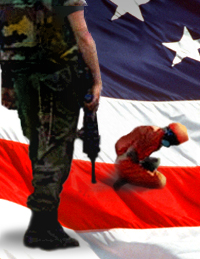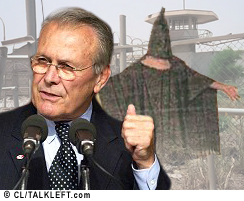Tag: detainees (page 9)
The New York Times has learned the CIA destroyed interrogation tapes of two al-Qaeda detainees.
The videotapes showed agency operatives in 2002 subjecting terror suspects — including Abu Zubaydah, the first detainee in C.I.A. custody — to severe interrogation techniques. They were destroyed in part because officers were concerned that tapes documenting controversial interrogation methods could expose agency officials to greater risk of legal jeopardy, several officials said.
Both the Judge in the Moussaoui case and the 9/11 Commission had requested the tapes:
The recordings were not provided to a federal court hearing the case of the terror suspect Zacarias Moussaoui or to the Sept. 11 commission, which had made formal requests to the C.I.A. for transcripts and any other documentary evidence taken from interrogations of agency prisoners.
The C.I.A. confirmed the destruction today when the Times informed the agency it would be publishing an article about the tapes tomorrow.
The CIA defends its actions but destruction of evidence and withholding information about the existence of evidence is a serious no-no. This could be a significant story. [More...]
(26 comments, 286 words in story) There's More :: Permalink :: Comments


Update: C-Span 3 is stream and playing the audio of the hearing now (11:44 am ET). The AP now has a report, Justices Grill Detainees' Lawyer, on how the arguments went.
The Supreme Court today is hearing oral arguments in the consolidated cases of Boumediene v. Bush and Al Odah v. U.S., 06-1196 regarding the rights of Guantanamo detainees to challenge the legality of their confinement in federal courts.
Lawyers for the foreign detainees contend the courts must step in to rein in the White House and Congress, which changed the law to keep the detainee cases out of U.S. courts after earlier Supreme Court rulings. The most recent legislation, last year's Military Commissions Act, strips federal courts of their ability to hear detainee cases.
Solicitor General Paul Clement, representing the administration, said foreigners captured and held outside the United States "have no constitutional rights to petition our courts for a writ of habeas corpus," a judicial determination of the legality of detention.
The Court may have to determine whether Guantanamo Bay in Cuba is really on U.S. soil. [More...]
(3 comments, 316 words in story) There's More :: Permalink :: Comments
This is a big week for the Center for Constitutional Rights with the Supreme Court about to hear oral arguments in the Guantanamo case, Al Odah v. United States. To raise consciousness on the case, it tried to buy an ad on Fox News. Fox rejected the ad. CCR says (no link yet, received by e-mail):
In our ad, Danny Glover says the Bush administration is “destroying the Constitution,” and they said we needed proof. Were they expecting video of Bush sneaking into the Library of Congress with a shredder? I wonder how many times Bill O’Reilly has accused someone of destroying America or destroying Christmas?
You can watch the ad, Rescue the Constitution, here.
The CCR also has a campaign to send President Bush a copy of the Constitution as a Christmas present.


The Bush Administration insists it does not torture. Former detainees say otherwise.
AMMAN, Jordan -- Over the past seven years, an imposing building on the outskirts of this city has served as a secret holding cell for the CIA.
The building is the headquarters of the General Intelligence Department, Jordan's powerful spy and security agency. Since 2000, at the CIA's behest, at least 12 non-Jordanian terrorism suspects have been detained and interrogated here, according to documents and former prisoners, human rights advocates, defense lawyers and former U.S. officials.
The Jordanians specialized in two tactics:
Former prisoners have reported that their captors were expert in two practices in particular: falaqa, or beating suspects on the soles of their feet with a truncheon and then, often, forcing them to walk barefoot and bloodied across a salt-covered floor; and farruj, or the "grilled chicken," in which prisoners are handcuffed behind their legs, hung upside down by a rod placed behind their knees, and beaten.
Former detainee Al-Haj Abdu Ali Sharqawi says:
"I was kidnapped, not knowing anything of my fate, with continuous torture and interrogation for the whole of two years," Al-Haj Abdu Ali Sharqawi, a Guantanamo prisoner from Yemen, recounted in a written account of his experiences in Jordanian custody. "When I told them the truth, I was tortured and beaten."
More...
(5 comments, 824 words in story) There's More :: Permalink :: Comments
A sensitive manual on Guantanamo detainees has been leaked.
The 238-page document, "Camp Delta Standard Operating Procedures," is dated March 28, 2003. It is unclassified, but designated "For Official Use Only." It hit the web last Wednesday on Wikileaks.org.
What's Wikileaks?
The Pentagon has been resisting -- since October 2003 -- a Freedom of Information Act request from the American Civil Liberties Union seeking the very same document.
Anonymous open-government activists created Wikileaks in January, hoping to turn it into a clearinghouse for such disclosures. The site uses a Wikipedia-like system to enlist the public in authenticating and analyzing the documents it publishes.
As to the document itself, it's a layout of Camp Delta and its policies. The full, 237 page document is here.
[Hat tip to reader Scribe.]
(7 comments) Permalink :: Comments

The ACLU will be at Guantanamo tomorrow to monitor the military commission hearing of Omar Khadr. The process so far:
Khadr, now 21, was 15 years old when he was captured by U.S. forces in Afghanistan. He is the first detainee to face a military commission since June when charges against him and a Yemeni prisoner, Salim Hamdan, were thrown out by military judges who said the commission lacked proper jurisdictional authority to prosecute them. The military judges ruled that the two defendants had not been designated “unlawful enemy combatants” as required under the Military Commission Act signed into law by President Bush in October 2006.
The U.S. government appealed the dismissal of the cases, and the newly established U.S. Court of Military Commission Review – a panel of three military officers appointed by the Pentagon – reinstated the charges in September by deciding that the military commission judges have the authority to decide whether detainees should be deemed “unlawful” enemy combatants. Despite an appeal filed by Khadr’s lawyers with the United States Court of Appeals for the District of Columbia, the military judge in Khadr’s case, Col. Peter Brownback, will hear the case Thursday.
Omar is a Canadian teenager and child of Jihad, captured in Afghanistan and sent to Gitmo where he alleges he was tortured.
In February, his U.S. lawyer told reporters the teenager had been used as a human mop to clean urine on the floor and had been beaten, threatened with rape and tied up for hours in painful positions at Guantanamo Bay.
(4 comments) Permalink :: Comments


I'll believe it if it happens, but according to the New York Times, Bush administration officials are discussing providing more legal rights to the Guantanamo detainees it seeks to hold as enemy combatants.
The discussions are described as a step on the road to closing Gitmo. Why the change of heart? The Administration may be fearful the next case the Supreme Court decides will be too generous to the detainees.
The administration has fought for years in court and in Congress against granting the detainees more rights. In the latest instance, the Supreme Court is to consider a case brought by Guantánamo detainees who are seeking to challenge their confinement in habeas corpus suits in federal court.
If the administration loses that case, it could give the detainees even more legal rights and create a precedent limiting the president’s and the military’s power. Lawyers inside and outside of government said a detailed proposal from the administration to give detainees fuller legal protections could convince the justices that they need not resolve the case, Boumediene v. Bush.
More...
(3 comments, 448 words in story) There's More :: Permalink :: Comments

The Center for Constitutional Rights and other human rights groups filed a complaint in Paris against Donald Rumsfeld last night alleging he ordered and authorized torture.
Rumsfeld is in Paris to give a talk on foreign policy.
“The filing of this French case against Rumsfeld demonstrates that we will not rest until those U.S. officials involved in the torture program are brought to justice. Rumsfeld must understand that he has no place to hide. A torturer is an enemy of all humankind,” said CCR President Michael Ratner.
“France is under the obligation to investigate and prosecute Rumsfeld’s accountability for crimes of torture in Guantanamo and Iraq. France has no choice but to open an investigation if an alleged torturer is on its territory. I hope that the fight against impunity will not be sacrificed in the name of politics. We call on France to refuse to be a safe haven for criminals.” said FIDH President Souhayr Belhassen.
More....
(16 comments, 364 words in story) There's More :: Permalink :: Comments
It didn't make much news last week when Air Force Col. Morris Davis, the lead prosecutor at Guantanamo Bay, resigned. The articles I read said something about his not being happy that another official,Air Force Brig. Gen. Thomas Hartmann, was usurping his power and that Hartmann should remain neutral.
Davis abruptly resigned after complaining that his authority in prosecutions was being usurped. He argued that , a new legal adviser to the convening authority for military commissions, should remain a neutral and independent party and should leave prosecuting cases to prosecutors.
Now, the real reason for his quitting comes out.
Politically motivated officials at the Pentagon have pushed for convictions of high-profile detainees ahead of the 2008 elections, the former lead prosecutor for terrorism trials at Guantanamo Bay said last night, adding that the pressure played a part in his decision to resign earlier this month.
Senior defense officials discussed in a September 2006 meeting the "strategic political value" of putting some prominent detainees on trial, said Air Force Col. Morris Davis. He said that he felt pressure to pursue cases that were deemed "sexy" over those that prosecutors believed were the most solid or were ready to go.
...."There was a big concern that the election of 2008 is coming up," Davis said. "People wanted to get the cases going. There was a rush to get high-interest cases into court at the expense of openness."
There was also a disagreement about use of classified evidence at the detainees' trials:
(4 comments, 361 words in story) There's More :: Permalink :: Comments
A federal judge in Washington, D.C. Gladys Kessler, has granted a preliminary injunction to a Guantanamo detainee. It is believed to be the first time a federal court has said "no" to the Pentagon. The case is RAFIQ BIN BASHIR BIN JALLUL ALHAMI et al., vs. GEORGE W. BUSH, et al.
The opinion, unsealed today, is here.
In a nutshell, the Pentagon wanted to send Gitmo detainee Mohammed Rahman, a Tunisian, back to Tunisia to serve a 20 year sentence for a crime for which he was charged and tried in absentia since his arrival at Guantanamo. He objected, arguing among other grounds, he would be tortured in a Tunesian prison. He filed a habeas action seeking an order preventing his transfer.
From the opinion:
Petitioner Rahman (“Rahman”) is a Tunisian citizen allegedly captured by Pakistani bounty hunters and transferred to the custody of the United States on an undisclosed date. He has been detained in Guantanamo Bay since shortly after his capture. Rahman maintains that Combatant Status Review Tribunal (“CSRT”) proceedings have never resulted in any finding that he is an “unlawful” enemy combatant. On May 15, 2007, the Government provided notice to Petitioners and the Court of its intention to transfer Rahman out of Guantanamo Bay and release him to the Government of Tunisia. A 20-year prison sentence awaits Rahman in Tunisia.
More...
(6 comments, 522 words in story) There's More :: Permalink :: Comments
Bump and Update: The New York Times has a new article describing the two memos from 2005:
One 2005 opinion gave the Justice Department’s most authoritative legal approval to the harshest agency techniques, including head slapping, exposure to cold and simulated drowning, even when used in combination.The second opinion declared that under some circumstances, such techniques were not “cruel, inhuman or degrading,” a category of treatment that Congress banned in December 2005.
As one Senator opined today:
“I find it unfathomable that the committee tasked with oversight of the C.I.A.’s detention and interrogation program would be provided more information by The New York Times than by the Department of Justice,” Mr. Rockefeller wrote.
As for the timing of the memos:
A senior administration official who insisted on anonymity said the opinion on the “combined effects” of different techniques was approved in May 2005.The opinion that the methods were not cruel or inhuman was approved later in 2005, the official said. Officials have said both opinions remain in effect.
*******
Original Post
White House Denies Memos Authorized Torture
Predictably, the White House is denying that memos issued in 2005 authorized previously prohibited CIA interrogation techniques that amount to torture.
More...
(4 comments, 545 words in story) There's More :: Permalink :: Comments


Following up on Big Tent Democrat's earlier post, the New York Times has a five page article revealing that in 2005, over the objections of his Deputy Attorney General James Comey, Attorney General Alberto Gonzales approved legal opinions written by Steven Bradbury concerning enhanced interrogation techniques.
The 2005 Justice Department opinions remain in effect, and their legal conclusions have been confirmed by several more recent memorandums, officials said. They show how the White House has succeeded in preserving the broadest possible legal latitude for harsh tactics.
Who is Bradbury? [More...]
(5 comments, 791 words in story) There's More :: Permalink :: Comments
| << Previous 12 | Next 12 >> |







